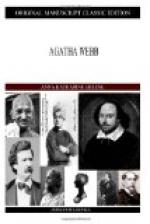Frederick’s breath came easier.
“Some of them were written years ago—most of them, in fact. It is a personal matter—every man has such. I wish I could have destroyed them. You will leave them with Agnes, sir?”
“You astonish me,” said Mr. Sutherland, relieved that he could at least hope that these letters were in nowise connected with the subject of his own frightful suspicions. “A young girl, to whom you certainly were most indifferent a week ago, is a curious guardian of letters you decline to show your father.”
“I know it,” was Frederick’s sole reply.
Somehow the humility with which this was uttered touched Mr. Sutherland and roused hopes he had supposed dead. He looked his son for the first time directly in the eye, and with a beating heart said:
“Your secrets, if you have such, might better be entrusted to your father. You have no better friend—” and there he stopped with a horrified, despairing feeling of inward weakness. If Frederick had committed a crime, anything would be better than knowing it. Turning partially aside, he fingered the papers on the desk before which he was standing. A large envelope, containing some legal document, lay before him. Taking it up mechanically, he opened it. Frederick as mechanically watched him.
“I know,” said the latter, “that I have no better friend. You have been too good, too indulgent. What is it, father? You change colour, look ill, what is there in that paper?”
Mr. Sutherland straightened himself; there was a great reserve of strength in this broken-down man yet. Fixing Frederick with a gaze more penetrating than any he had yet bestowed upon him, he folded his hands behind him with the document held tightly between them, and remarked:
“When you borrowed that money from me you did it like a man who expected to repay it. Why? Whence did you expect to receive the money with which to repay me? Answer, Frederick; this is your hour for confession.”
Frederick turned so pale his father dropped his eyes in mercy.
“Confess?” he repeated. “What should I confess? My sins? They are too many. As for that money, I hoped to return it as any son might hope to reimburse his father for money advanced to pay a gambler’s debt. I said I meant to work. My first money earned shall be offered to you. I—”
“Well? Well?” His father was holding the document he had just read, opened out before his eyes.
“Didn’t you expect this?” he asked. “Didn’t you know that that poor woman, that wretchedly murdered, most unhappy woman, whose death the whole town mourns, had made you her heir? That by the terms of this document, seen by me here and now for the first time, I am made executor and you the inheritor of the one hundred thousand dollars or more left by Agatha Webb?”
“No!” cried Frederick, his eyes glued to the paper, his whole face and form expressing something more akin to terror than surprise. “Has she done this? Why should she? I hardly knew her.”




